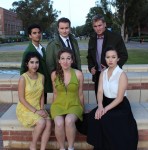While the belligerent relationship between the characters Beatrice and Benedick has been played out on stages across the centuries, the Shakespeare Company at UCLA’s “Much Ado About Nothing” revives the classic feud in an era known for bouffant hair, rock music and liberation.
Running from May 30 to June 1, the Shakespeare Company at UCLA transports Shakespeare’s classic comedy to 1960s England in an entirely modernized version of the 16th-century classic. The rendition exposes the tragic but also comical effects of gossip in addition to more topical gender themes of recent decades.
“Much Ado About Nothing” is part of a repertoire of seasonal shows produced and acted out by the Shakespeare Company at UCLA, a student-run independent theater company. The group allows a space for theater and non-theater students alike to work together, offering free shows to the UCLA community.
Centering on the relationships that form between two rival youth groups in 1960s England, “Much Ado About Nothing” places and divides classic characters into the Mods and the Rockers, two subcultures divided by their lifestyle, world view and fashion.
In the play, these two groups, and the genders that make them up, clash in the confines of a prim and proper all-girls boarding school. But once one Mod and one Rocker – Claudio and Hero – fall in love, the fate of two other contending and equally sharp-tongued characters is comically plotted.
“It’s basically a Shakespearean romantic comedy,” said Tim Myer, a second-year English student who plays a clueless security guard named Dogberry. “There’s a guy and girl who hate each other, and they’re not shy about that. But then their friends decide to play a game to get them to fall in love.”
In addition to lighter comedic elements, “Much Ado About Nothing” also brings to the surface thematic issues that are well-represented in the 1960s era, including women’s rights and liberation, as well as the even moretopicalissue of “slut-shaming,” said Leland Frankel, a second-year theater student and the play’s director.
In the play, the engagement between Claudio and Hero goes sour when Hero is accused of being unfaithful. In order to prove her purity, drastic measures are taken.
“There are still people out there who judge others either on their sexual preferences or their sexual history, and that’s such a key point in here and how it’s addressed,” Frankel said. “It’s still not addressed perfectly because I think Shakespeare was a man of his time, but the fact that he brought it up at all is an important thing for us to still reflect upon today.”
The 1960s era not only amplifies thematic elements of the play but also provides a setting complete with mod- and rocker-influenced music. The Beatles, The Kinks, John’s Children, The Who and newly crafted compositions for original lyrics in the play make up just some of the music being played both on record and in person, Frankel said.
In order to fully partake in the Mod and Rocker persona, the actors don period-appropriate costumes and speak in character with British accents, said Haley Bartels, a fourth-year English student who plays the lead character of Beatrice.
Before he auditioned for his part, Myer said he watched a heap of YouTube videos on the cockney accent to master the exaggerated British inflection that defines his comedic character.
Bartels said that while the cockney accent places the character of Dogberry into the lower class and reveals his desire to move up in the world, her posh accent exposes Beatrice’s high-class rearing and expectations.
In addition to needing to speak in British accents, the actors within “Much Ado About Nothing” also have to completely understand all the Shakespearean language of the script. Myer said this comprehension came through repeatedly reading the play and working with a dramaturge, the club’s expert on Shakespeare.
“We just sit down with the script and go over what every single word means,” said Julie Lanctot, a second-year theater student and the producer of the play. “If the actors don’t know what the words mean then the audience sure won’t.”
With a plot riddled with disguises, mistaken identities and false accusations, the type of actions that make up the play can be recognized in the play’s title.
“The title itself is a play on words: It’s originally “Much Ado About Noting,’” Frankel said. “It’s the idea of hearsay and gossip and how that can affect people.”
In a plotline driven by the effects of gossip and miscommunication, “Much Ado About Nothing” is relevant in regard to the dating scene in today’s generation, Bartels said. While methods of digital communication are abundant, disjointed inter-gender communication still prevails.
Lanctot also said this male-female disjunction is a realistic situation prevalent today, identifying the kind of love she sees in the play with the ups and downs she sees from her friends. The struggles that are brought to the table in this updated version may, in the end, bring a positive message to struggling audience members.
“It’s all about finding love despite the lack of an ability to communicate,” Bartels said. “It’s uplifting. If people as emotionally unequipped as Beatrice and Benedick can make it work, then maybe you can too.”
